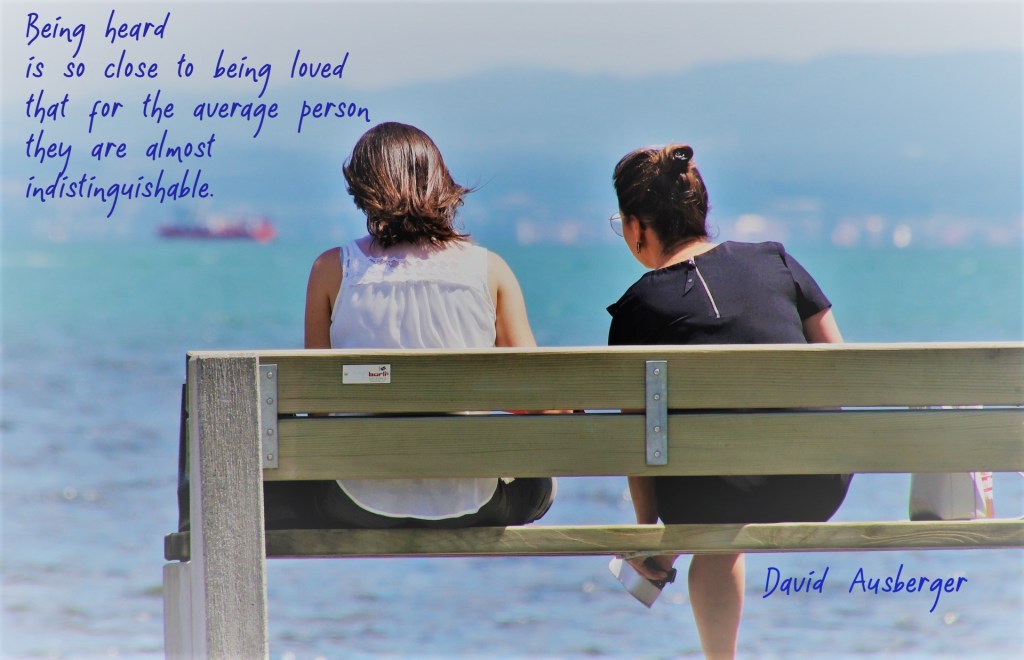Other People’s Squabbles
A little while back, I violated three of my own friendship rules.
I was friends (and still am, I hope) with Edie, a woman who was often at odds with her adult daughter, Fran.
We’d meet quite often for lunch, or shopping, or Yoga, or just coffee, and she’d give me her ‘upset smile.’ (We all know what that is – we all have an upset smile, and we all know what everyone else’s looks like.) I’d know she had argued with her daughter again.
Edie was distraught at least once a week by Fran’s behavior.
When Fran graduated from college, she moved to the Midwest, and so the biggest issues revolved around visiting. Fran was not coming to visit. Or she did come to visit but spent most of the day with her girlfriends, so it didn’t count. Or Fran spent too much time with her father (Edie’s ex), and Edie’s feelings were hurt. Or Edie flew out to see Fran, but Fran had an emergency at work and couldn’t take the day off, or Fran invited Edie, but asked her to stay in a hotel.
And there were arguments. In person, by phone, by text. Edie’s house was too dated. Fran’s apartment was not tidy. They couldn’t agree on a restaurant. Edie was too critical. Fran was too critical. Each thought the other was a bad driver, a bad dresser, a bad example.
I listened to all of it. But I didn’t just listen.
And that is why I violated three of my interpersonal rules.
First: Rule Number One: Always remember that there are many different kinds of families.
I never for one minute doubted that Edie and Fran loved each other. But not all relationships are sweet and supportive. I know more than one family whose love is intense – usually of the shouting variety. Some mother/daughter love is based on mutual dependence. Some are formal – like a throwback to Queen Victoria. Some are best friends. And some are combative.
But it’s still love.
That was my first mistake. That I thought Edie’s relationship with her daughter should be different.
Which leads me to Rule Number Two: Don’t take sides in other people’s squabbles.
When I was a kid, my mother had a pact with all the other neighborhood mothers. They agreed never to interfere in the kids’ squabbles. As my mother put it, “You kids will fight and make up in half an hour. But us mothers – if we get involved, we may end up enemies forever.”
But I wanted to fix Edie and Fran.
At first, I tried presenting Fran’s side, since she was not there to defend herself from Edie’s complaints. I reasoned that maybe the stress from Fran’s job spilled over into her personal relationships, and she was just exhausted. But my rationalizing Fran’s behavior made Edie feel like her own friend (me) was not on her side. She even wondered aloud whether Fran had contacted me to gang up on her mother.
So then I took the other side. I told Edie that she had every right to be upset, that her daughter should be more respectful, more flexible. But then Edie felt compelled to defend the daughter she loved so much, and was angry at me for criticizing her beloved baby. That strategy worked better, because then Edie felt more forgiving towards her daughter. But the downside was that she was mad at me.
Which is why Rule Number Two is so important.
I wanted to fix Edie and Fran. But they didn’t need fixing. They always made up, but my friendship with Edie suffered.
Which leads me to Rule Number Three: Listen.
This one did not come from Mom. This was something I learned gradually (and rather surprisingly) during my career.
When I became a manager, I had to deal not only with my subordinates’ performance, but with their personalities, attitudes, and issues.
When my staff was at its largest (about 35), it wasn’t unusual to have at least one person a day come to me upset about something.
I was working at a break-neck pace myself, and seeing another distraught face emerge in my doorway often put my own deadlines in peril.
But over time, I stumbled on an amazingly successful response.
I would say to the aggrieved employee, “I’m swamped, as usual, but I can give you five minutes right now if all you need is to vent, or I can schedule you for an hour later in the week to have a deeper discussion.”
And incredibly, almost every single time, the employee would opt for the five-minute gripe session.
BECAUSE:
Rule Number Three: Most people do not need or want you to solve their problems. They want you to LISTEN.
And that is my biggest mistake with Edie. I didn’t need to fix anything. I didn’t need to take sides. I didn’t need to give her advice.
All I had to do was listen.
And she would feel better.
And in these times of turmoil and worry, if I am ever lucky enough to have coffee with Edie again, and she complains about Fran, I will say,
“I can see it’s making you sad. I’m so sorry.”
And I hope she will feel better.

- Posted in: Humor



I learned these lessons early on the hard way. I good friend decided to leave her husband. She was going to move out when he was at work and asked two of her friends to help her move her furniture (I was one). As you can guess, eventually they got back together but he always hated the two friends who helped her and it ended my friendship with her. I should have helped her on the condition she told her husband what she was doing. He wasn’t violent or a bad guy. She just didn’t like conflict.
LikeLiked by 1 person
I always try and listen and not judge or take sides not always easy though but I keep trying
LikeLike
I have to admit, I am soooooo bad at listening, and yet there were days when I wanted my dear departed spouse to understand that when a woman bitches and moans her worst, she isn’t asking for the problem to be fixed, she just needs someone to listen and go “Uh huh. I see.” And not offer constructive assistance to solve the problem. I’m getting better with this with my grown kids … I think. Maybe. And my friends. I hope you and Edie manage to iron things out and get back to being the good friends you are meant to be.
LikeLike
Totally agree.
LikeLike
great advice! I have had to learn that while we may be on similar journeys, the speed at which we are traveling is different. I might get to a realization or life lesson sooner or WAY after another and vice versa. Still, it’s hard to stand by and watch as a good friend suffers through a difficult relationship ~ but ultimately the decision to remain ( even to remain in conflict with a family member) is theirs and theirs alone. Still, not easy!
~MJ
LikeLike
This is great advice. Sometimes I just need someone to talk things through with – I ‘m not looking for advice, or support, or an argument. I just need someone to listen. Unfortunately, most people haven’t mastered that skill (me included!) Women, in particular, need to learn to start a ‘rant’ with the words, “I just need you to listen, okay?”
LikeLike
So true Nancy. It would appear that I am a good listener as even strangers will talk to me about their troubles. Just nice to have a third party sounding board I guess.
LikeLike
You’re so right! I often make the same mistake of wanting to help by fixing things, but it rarely, if ever works. I think people mostly just want to be heard, so that is really the most helpful thing we can do for them…just listen to them.
LikeLike
Tom Hanks recently touted one of his disciplines on listening. He referred to it as “WAIT” . Why am I talking. I have been trying very hard to listen more and talk less.
LikeLike
It’s what the world needs now: Listen.
LikeLike
I’m so curious (having finally just read, “Men Are From Mars, Women Are From Venus,” LOL) – were your employees a mix of men and women, or all/mostly women? According to the famous book, it’s women (or those who identify as women) who just need a listening ear… (Men in conversation, again according to the book, need validation in terms of their competence, e.g., “You’ll figure it out.”)
LikeLike
So true, being heard is being loved. Tune in – try not to judge – and just be there… nothing takes the place of a listening ear and a sympathetic heart!! ❤
LikeLike
You are right about us not being able to fix other people and them not wanting us to fix them, but to hear them, to listen. I eventually figured that out and it is a big improvement.
LikeLike